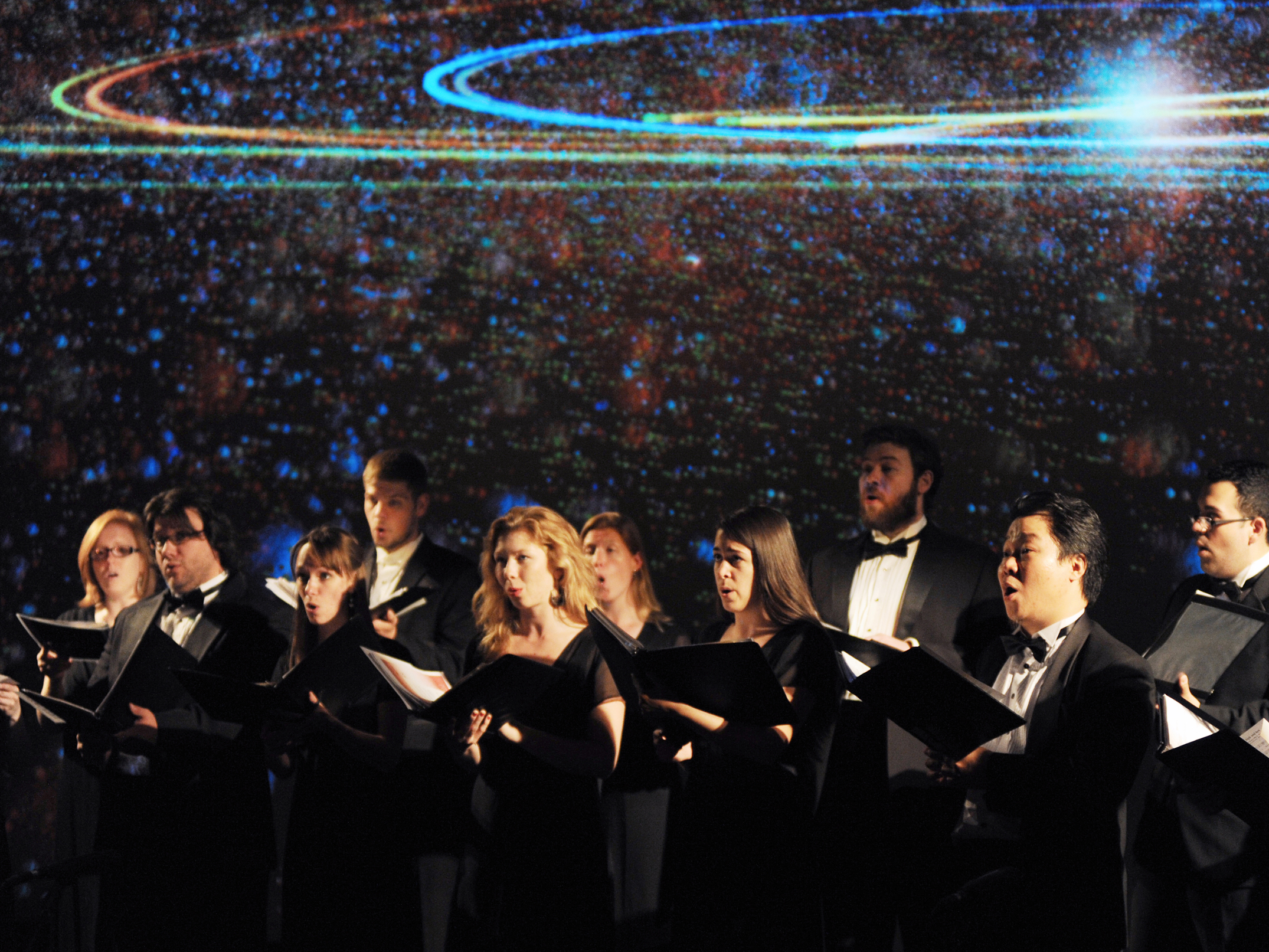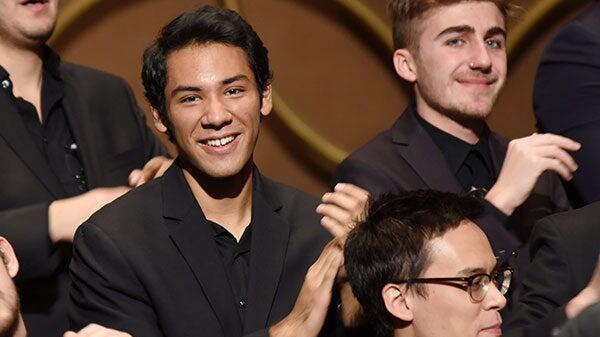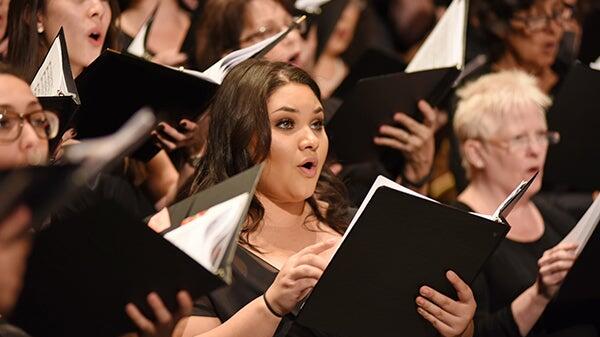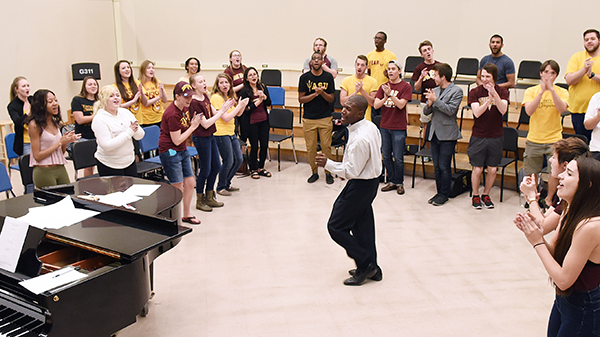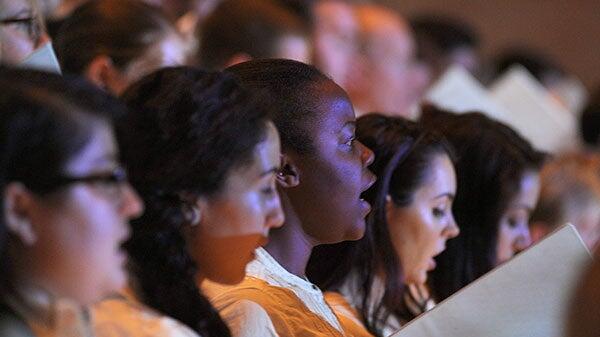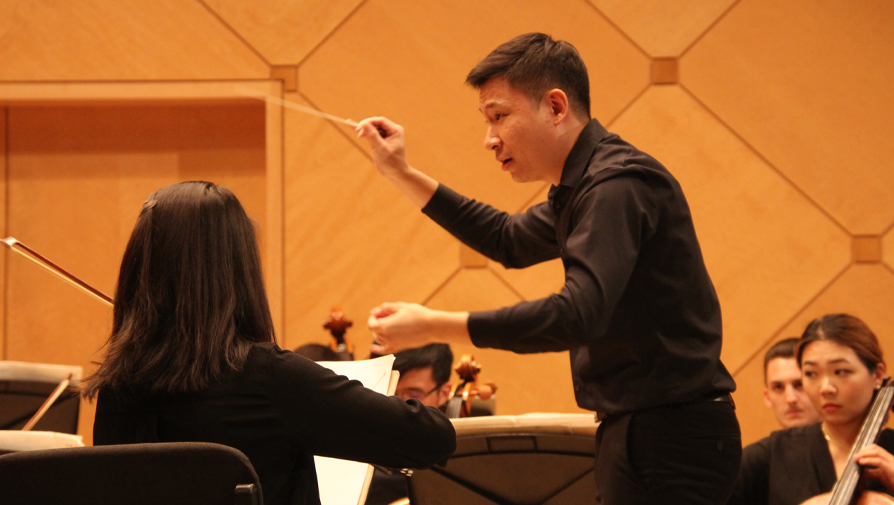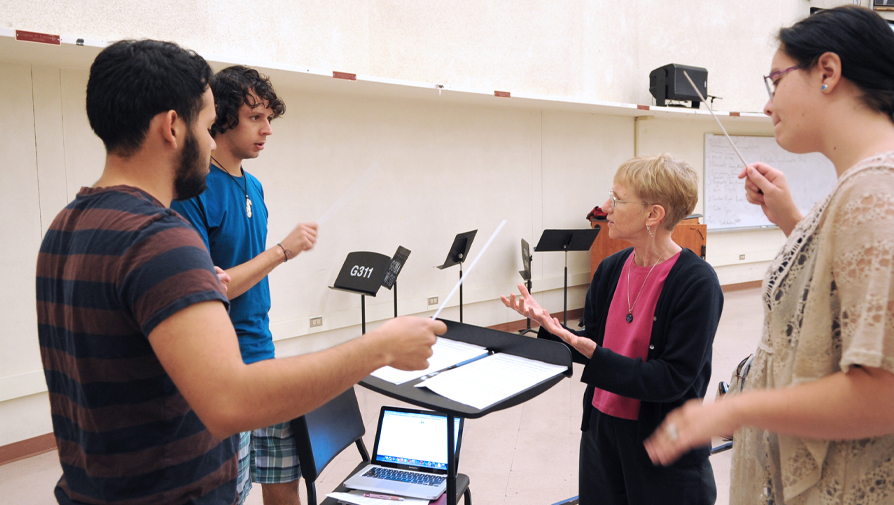
The Choral program
There is a place for you in the ASU Choirs!
Regardless of your major or academic standing, with six ensembles in our program, there is a place for everyone! From community members in the Phoenix area, choral aficionados, and even individuals contemplating singing with other people for the very first time, all are welcome!
Cantamos Con Alegría! We Sing With Joy!
Join us!
Choral opportunities
Degree seeking students can find more information about joining a choral here.
Non-degree seeking students can find more information about joining a choral ensemble here.
For community members, please inquire with our director of choral activities, Dr. Frank Watkins.
Our Choral Program offers a variety of graduate degrees for choral artists looking to further their study.
MM in Performance (Conducting), Choral Conducting Track
DMA in Music (Conducting emphasis), Choral Conducting Track
Students engaging in our choral conducting programs expand their expertise in global and intercultural approaches in communal vocal musicking and work to integrate this into their pedagogy and rehearsal process. Students expand their skills in score study by integrated musical, textual and socio-critical analysis in order to gain insights into the unique interpretive demands of each work. Students anchor their gestural study in integrated approaches of western ideals of conducting with Laban movement, global dance forms and body mapping. Conductors receive a plethora of podium time, both as primary conductors of ASU choral ensembles and as assistant conductors to faculty led ensembles. Our graduates in these programs go on to serve as choral faculty for respected institutions in higher education and K-12 programs, artistic and/or music directors of community, semi-professional, and professional ensembles, or as global choral entrepreneurs.
MM in Music Learning and Teaching
PhD in Music Learning and Teaching
Graduate study in Music Learning and Teaching are for musician-teacher-scholars who seek careers in musical and educational leadership. Music Learning and Teaching PhD and MM students are immersed in an open, inclusive and multi-faceted community of dynamic partnerships, research and teaching collaborations and creative enterprise. Students work each semester with outstanding faculty on creative projects and initiatives that lead to independent and co-authored research and publication. PhD and MM students have opportunities to diversify their thinking and further their goals by accessing internationally recognized faculty in other schools and colleges at ASU. Graduate students in Music Learning and Teaching complete the program with many possible career options and pathways ahead.
In addition to a diverse array of choral ensembles, our choral faculty and graduate instructors facilitate a plethora of courses for undergraduate music majors and minors interested in choral conducting, literature, and pedagogy. Our program ideates innovative approaches to the facilitation and scholarship of communal vocal music and catalyzes the artistic and pedagogical expansion of future music educators (please hyperlink to undergraduate MLT program), performers (please hyperlink to undergraduate MTO program), composers (please hyperlink to undergraduate composition program), musicologists/ethnomusicologists ((please hyperlink to undergraduate musicology program), and other fields both in and outside of music. We share the undergraduate courses that we offer through our program below.
MUP 209 Beginning Choral Conducting and Literature
A hands-on course that covers the fundamental concepts of choral conducting gesture, score study, choral literature selection and history, and pedagogy. The class is offered every semester for 1 unit.
MUP 494 Special Topics: Advanced Choral Conducting and Literature
A hands-on course that covers advanced concepts of choral conducting gesture, score study, choral literature selection and history, and pedagogy. Additionally topics include musical theater and choral/instrumental conducting. The class is offered every spring for 1 unit.
MUE 325 Voice/Choral Lab
A methods course that builds fundamental skills needed to model, facilitate, and accompany singing environments. Specific focus will be placed on developing solo and choral singing techniques, understanding of basic vocal anatomy and function, accompanying and arranging for solo and communal singing on ‘ukulele, guitar, and piano. This class is offered every fall for 2 units.
MUE 479 The Art of Teaching Beginning Vocalists
Examines the instructional techniques appropriate for elementary and middle school vocal music as well as the selection of appropriate vocal music repertoire and related organizational procedures. Students investigate a number of contemporary music methodologies and experience teaching both in and out of class.
MUE 480 The Art of Teaching Advanced Vocalists
Examines the instructional techniques appropriate for high school vocal music as well as selection of appropriate vocal music repertoire and related organizational procedures. Students investigate a number of contemporary music methodologies and experience teaching both in and out of class.
2025 ASU High School Vocal Connection
Saturday, Sept. 6, 2025
The 2025 ASU High School Vocal Connection will be held at the ASU School of Music, Dance, and Theatre on Saturday, September 6, 2025.
Colleagues from the ASU School of Music, Dance and Theatre will engage students in choral rehearsal, choir games, leadership training and other embodied choral experiences that will aid in building momentum and engagement for high school vocal programs.
Separate sessions are planned for teachers with an emphasis on practical skills, programming ideas and repertoire facilitated by our choral faculty.
This year's Vocal Connection will begin at 9 a.m. and end at 1:30 p.m. (please see schedule).
There is no charge to high school vocal teachers, students or participating school for this event.
Please register at 2025 High School Vocal Connection.
Registration will be confirmed in early fall. Parking information and arrival procedures will be conveyed with the confirmation.
If you have questions, please contact Dr. Frank Watkins.
ASU High School Vocal Connection 2025 Schedule
8-8:30 a.m. Registration
9-9:45 a.m. Welcome, warmup, group sing in Katzin Concert Hall (Dr. Frank Watkins, Professor Nathan Myers)
9:50 a.m. -12 noon Group sessions as noted.
See below for an example of the 2024 schedule.
| BLUE | RED | GREEN | |
| 9:50-10:30 a.m. | SATB rehearsal with Megann Salā (Gammage 301) | Choir Fun and Games (Gammage 311) | Choir Leadership (Katzin Concert Hall) |
| 10:35-11:15 a.m. | Choir Fun and Games (Gammage 311) | Choir Leadership (Katzin Concert Hall) | SATB rehearsal with Megann Salā (Gammage 301) |
| 11:20 a.m.-12 noon | Choir Leadership (Katzin Concert Hall) | SATB rehearsal with Megann Salā (Gammage 301) | Choir Fun and Games (Gammage 311) |
For teachers:
10-10:50 a.m. Thoughts about rehearsal techniques, choral philosophy and programming (Bode)
11-11:50 a.m. Ubuntu! Harambee! Songs of South Africa and Keya (Palkki)
For everyone:
12 noon Concert choir performance; High School choir performance (TBA); SATB group sing (Salā)
12:30 p.m. Closing thoughts; end of day
Choral faculty
